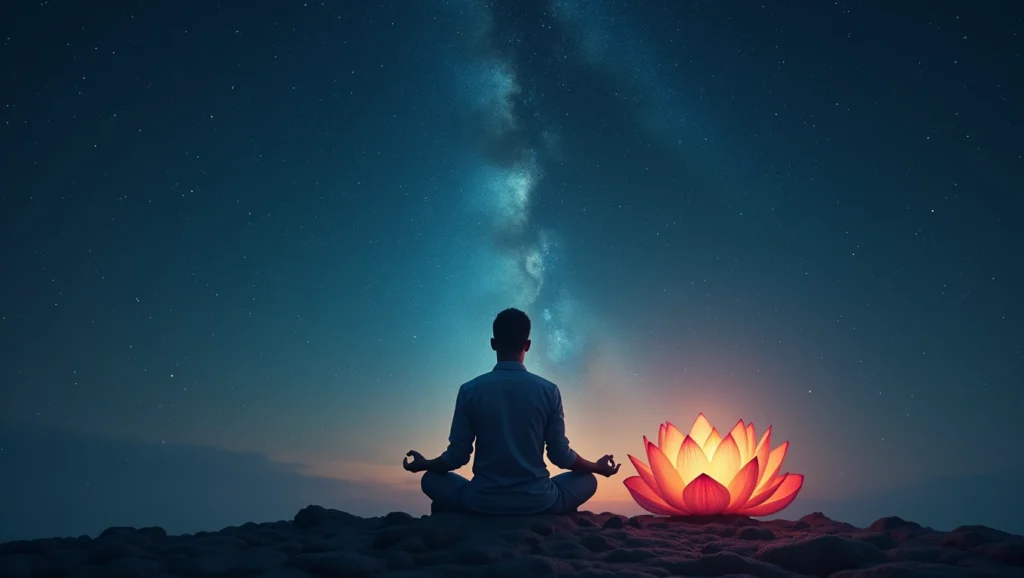Do you seek to see yourself and quiet your mind? Perhaps that could be Vipassana Meditation. This ancient, again mindfulness-based, practice has changed the way I see myself, and it’s helped me stay sane even on the craziest days. And Vipassana Meditation is about watching your thoughts and feelings to reveal profound truths. In this guide, I will take you through its techniques, benefits and how to embark with your own Vipassana Meditation experience! The meaning of life is not creating an infinite list that we keep going forward on, but rather finding a way to inner peace — whether we like it or not!
1. What Is Vipassana Meditation?
1.1 Ancient Roots
Vipassana Meditation, or “insight,” originated 2,500 years ago with the Buddha in India. Brought back to life by the likes of S.N. Goenka, it’s practiced all over the globe now. Check Dhamma.org for its history.
1.2 Core Ideas
Insight meditation emphasizes observing things as they are — impermanent, interrelated. Vipassana Meditation trains you to witness without grasping, bringing clarity and peace.
1.3 How It Stands Out
Differing from mantra or guided practices, Vipassana Meditation is silent and observational in nature. This is less about focus and more about awareness, which makes it somewhat different from mindfulness or loving-kindness meditation.

2. How to Practice Vipassana Meditation
2.1 Getting Ready
For Vipassana Meditation sit either on ground in a cross-legged position or on a chair Pick a quiet spot. My balcony works perfectly.
2.2 Breath and Body Scan
Begin with watching your breath, noticing each in-breath and out-breath. Then take a scan of your body, noticing feelings like warmth or tingling. This forms the basis of insight meditation.
2.3 Staying Equanimous
Simply feel sensations — hot, cold, pain, joy — without reacting. Vipassana Meditation teaches you equanimity, so you can remain balanced in whatever arises.
3. Why Try Vipassana Meditation?
3.1 Mind Benefits
Vipassana Meditation Reduces Depression and Anxiety Studies claim it enhances mental clarity, as though fog were receding from your brain.
3.2 Body Boosts
It reduces stress hormones, according to Isha Foundation. A week of Vipassana Meditation even got me sleeping better.
3.3 Deeper Awareness
Vipassana practice enhances self-awareness, allowing you to control your emotions. You will be able to know yourself better.
4. Joining a Vipassana Retreat
4.1 Retreat Setup
A standard Vipassana Mediation retreat is 10 days long, with 10 hours of meditation each day, silence, and simple food. It’s intense but rewarding.
4.2 Rules to Follow
No chatter, no phones, no distractions. Guidelines keep the focus on insight meditation. You experience them more, and your respect deepens.
4.3 What It’s Like
Travel especially with patience and dedication, and expect long sits. It was difficult on my first retreat, but by day 5 it was lighter. Discover classes at our meditation center.

5. Living with Vipassana
5.1 Daily Practice
Vipassana Meditation — 10-20 minutes of Daily Meditation. Morning or evening works. Consistency builds insight.
5.2 Everyday Mindfulness
Practice Vipassana while you are living—observe your sensations while eating or walking. It keeps you grounded.
5.3 Staying Committed
Mind wandering? Normal. Gently refocus. Maintaining Vipassana through short sessions. See our mindfulness tips.
6. The Science Behind Vipassana
6.1 Brain Changes
Due to NCBS India, vipassana meditation expands gray matter in areas of concentration. It’s like exercise for your mind.
6.2 Mental Health Gains
Research has found that it lowers stress and enhances resilience. Published: Discover recommends insight meditation.
6.3 Lasting Effects
People who have practiced Vipassana for many years describe ongoing calm and clarity, even decades later.

7. Vipassana and Your Spiritual Path
7.1 Buddhist Roots
Vipassana in Buddhism discovers wisdom and freedom. It’s a touchstone for understanding life’s truths.
7.2 Wisdom and Kindness
But Vipassana practice cultivates compassion because it demonstrates that all beings have their struggles. You’ll feel more connected.
7.3 Self-Realization
Meditation leads you to your authentic self, beyond transitory thoughts. It’s a journey to peace.
7. Vipassana and Your Spiritual Path
7.1 Buddhist Roots
Meditation in Buddhism — Seeking wisdom and liberation It’s a foundation for understanding truth about life.
7.2 Wisdom and Kindness
It is the act of practicing vipassana itself that cultivates compassion by revealing the commonality of all beings struggling. You’ll feel more connected.
7.3 Self-Realization
Meditation helps you find your real self beyond the ever-changing thoughts. It’s a journey to peace.
Summary: Start Your Vipassana Journey
Meditation is indeed a powerful method that can lead to tranquility, clarity, and self-exploration. From reducing stress to enhancing wisdom, its advantages are deep. Beginning with a few minutes a day or trying a retreat to go deeper. Start Vipassana Meditation now — Your Inner Peace is waiting!
